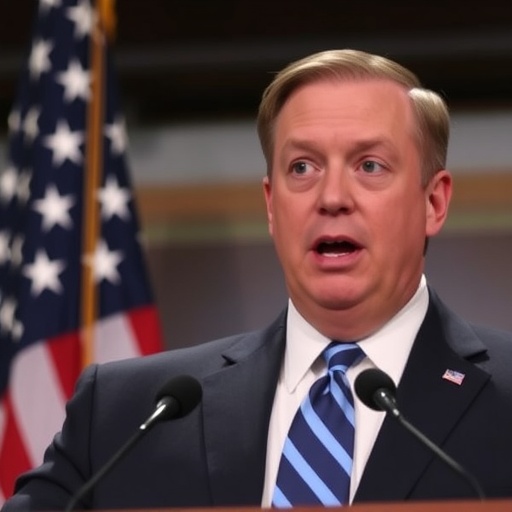House Speaker Mike Johnson Announces Trump’s Review of Military Pay Options During Government Shutdown Crisis
In a tense moment for the nation’s capital, House Speaker Mike Johnson revealed that President Donald Trump is actively reviewing potential options to guarantee military pay during the ongoing government shutdown, a move aimed at shielding service members and their families from financial hardship. This announcement comes as the shutdown enters its third week, with Congress deadlocked over budget disputes, leaving hundreds of thousands of federal workers, including military personnel, uncertain about their next paychecks.
- Johnson’s Capitol Hill Briefing: A Call for Unity on Military Support
- Trump’s White House Strategy: Prioritizing Troops in Shutdown Turmoil
- Congressional Deadlock: How Budget Battles Are Jeopardizing Military Pay
- Impact on Service Members: Stories from the Frontlines of Financial Strain
- Navigating Legal and Fiscal Hurdles: Pathways Forward for Shutdown Resolution
The revelation, made during a press conference on Capitol Hill, underscores the escalating pressure on lawmakers to resolve the impasse. Johnson, speaking with a sense of urgency, emphasized that while no concrete plans have been finalized, Trump’s administration is exploring every avenue to prioritize military pay amid the chaos. “Our brave men and women in uniform cannot be collateral damage in this political standoff,” Johnson stated, drawing applause from gathered reporters and staffers.
This development highlights the human cost of the government shutdown, which has already furloughed over 800,000 federal employees and strained essential services. For the roughly 1.3 million active-duty troops, the threat of delayed pay—last seen during the 2018-2019 shutdown—looms large, potentially affecting everything from mortgage payments to basic groceries.
Johnson’s Capitol Hill Briefing: A Call for Unity on Military Support
House Speaker Mike Johnson took the podium in the ornate Rayburn House Office Building yesterday afternoon, his expression a mix of resolve and frustration as he addressed the media scrum. Flanked by key Republican colleagues, Johnson laid out the latest from the White House, confirming that President Donald Trump had personally directed his team to investigate mechanisms for ensuring uninterrupted military pay. “President Trump is committed to our troops,” Johnson said, his voice steady. “He’s reviewing options right now, and we in Congress must do our part to end this shutdown without further delay.”
The briefing wasn’t just an update; it was a strategic plea. Johnson highlighted statistics from the Department of Defense, noting that during the previous shutdown in late 2018, over 200,000 civilian defense workers went unpaid for weeks, while active-duty personnel received back pay only after resolution. This time, with the shutdown triggered by disagreements over border security funding and disaster relief, the stakes feel even higher. Johnson referenced a recent Pentagon report estimating that a prolonged shutdown could cost the military $1.5 billion in operational disruptions alone.
Behind the scenes, sources close to the Speaker indicate that Johnson has been in near-constant communication with Trump’s chief of staff, discussing everything from executive orders to emergency congressional appropriations. Yet, Johnson was clear: no specifics could be shared until legal and budgetary hurdles are cleared. “We’re moving as fast as possible,” he added, urging Democrats in Congress to return to the negotiating table.
The Speaker’s words resonated beyond Washington. Military advocacy groups, such as the American Legion, issued statements praising the initiative. “This is a vital step toward protecting those who protect us,” said National Commander Danyell Green in a released comment. However, critics pointed out that such measures, while well-intentioned, might set a dangerous precedent for bypassing congressional oversight.
Trump’s White House Strategy: Prioritizing Troops in Shutdown Turmoil
From the Oval Office, President Donald Trump has long positioned himself as the ultimate supporter of the military, and this shutdown is no exception. In a series of tweets and internal memos leaked to the press, Trump has directed advisors to explore “creative solutions” for military pay, including potential diversions from existing defense funds or invoking the 1974 Impoundment Control Act to redirect unspent monies.
Trump’s involvement adds a layer of intensity to the crisis. During his first term, a similar shutdown over wall funding led to widespread anxiety among service members. Back then, Defense Secretary James Mattis publicly assured troops that pay would continue, but only through ad-hoc measures like borrowing from training budgets. Now, with Trump back in the spotlight, insiders say he’s drawing on those lessons. “The President won’t let our soldiers go without,” a senior administration official told reporters anonymously, emphasizing Trump’s review of options like the Military Personnel Appropriations Act.
Statistics paint a stark picture: The U.S. military supports over 2 million dependents, and a Government Accountability Office (GAO) study from 2019 found that shutdowns exacerbate mental health issues among troops, with a 20% spike in reported stress-related incidents. Trump’s strategy appears to focus on short-term fixes, such as authorizing the Treasury to issue IOUs or prioritizing pay in the event of a continuing resolution. However, legal experts caution that any unilateral action could face court challenges, reminiscent of the 2019 lawsuits that scrutinized similar moves.
Trump himself addressed the issue briefly during a cabinet meeting, stating, “Nobody fights harder for our military than me. We’ll get this done.” His words, while rallying, have sparked debate about the feasibility. Fiscal hawks in Congress, including some Republicans, worry that piecemeal payments could balloon the national debt, already at $34 trillion.
Congressional Deadlock: How Budget Battles Are Jeopardizing Military Pay
The root of this government shutdown lies in Congress‘s failure to pass a full-year budget, exacerbated by partisan rifts. Democrats, led by Senate Majority Leader Chuck Schumer, demand protections for social programs and climate initiatives, while Republicans, aligned with Trump, insist on increased funding for border enforcement. House Speaker Mike Johnson has been at the forefront of negotiations, but talks stalled last week after a proposed compromise bill failed a procedural vote by a slim 212-210 margin.
Historical context reveals a pattern: This is the fourth shutdown in the last decade, costing taxpayers an estimated $11 billion in lost productivity, according to the Congressional Budget Office (CBO). In 2013, a 16-day shutdown delayed pay for military academies, forcing cadets to forgo stipends. The 2018-2019 event, the longest on record at 35 days, saw active-duty pay protected by law, but reservists and National Guard members waited months for compensation.
Johnson’s announcement injects a bipartisan element into the fray. Several moderate Democrats, including Rep. Jared Golden from Maine—a Marine Corps veteran—have signaled support for military-focused resolutions. “Protecting pay shouldn’t be political,” Golden tweeted, echoing sentiments from the Blue Dog Coalition. On the Republican side, figures like Sen. Lindsey Graham have praised Trump’s proactive stance, calling it “a beacon in the storm.”
Yet, challenges persist. A list of key sticking points includes:
- Border Wall Funding: Trump demands $5 billion, while Democrats offer $1.3 billion for humanitarian aid.
- Disaster Relief: $20 billion sought for hurricane-hit states, but tied to unrelated spending cuts.
- Debt Ceiling: Looming increase adds pressure, with shutdown as leverage.
Analysts from the Bipartisan Policy Center predict that without intervention, the shutdown could drag into the holiday season, amplifying risks to military pay.
Impact on Service Members: Stories from the Frontlines of Financial Strain
Beyond the Beltway, the government shutdown is hitting home for military families across the country. In bases from Fort Bragg, North Carolina, to Joint Base Lewis-McChord in Washington state, service members are bracing for uncertainty. Sgt. Maria Lopez, a single mother stationed at Camp Pendleton, shared her fears in an interview with local news: “I’ve got bills piling up. If pay is delayed, I don’t know how I’ll make rent.” Lopez’s story is emblematic; a Military Family Advisory Network survey indicates that 40% of respondents are already dipping into savings due to shutdown fears.
The numbers are sobering. The active-duty force numbers 1.3 million, with an average monthly pay of $3,500 for enlisted personnel. Delays could lead to a cascade of issues: evictions, food insecurity, and even deployment readiness. During the 2018 shutdown, the VA reported a 15% increase in emergency financial counseling requests from veterans’ families.
House Speaker Mike Johnson has amplified these voices, incorporating letters from troops into his briefings. “These aren’t abstractions; they’re real lives,” he remarked. President Donald Trump’s review of options is seen as a direct response, potentially including accelerated processing of allotments or partnerships with credit unions for bridge loans.
Experts like Dr. Rachel Cohen from the Modern War Institute at West Point warn of long-term effects. “Financial stress erodes morale and retention,” Cohen explained in a recent op-ed. “We’ve lost good people before because of this.” Advocacy efforts are ramping up, with groups like USO launching emergency funds, but they stress that systemic fixes are essential.
In a poignant detail, reservists—who make up 800,000 of the total force—face unique hardships, as their civilian jobs are often furloughed too. Johnson’s push, backed by Trump, aims to address this disparity through targeted legislation.
Navigating Legal and Fiscal Hurdles: Pathways Forward for Shutdown Resolution
As House Speaker Mike Johnson and President Donald Trump navigate the complexities, legal pathways emerge as critical. One option under review is the Pay Our Military Act, a 2010 law that mandates priority funding for troops during lapses. However, its scope is limited to active-duty pay, excluding contractors and civilians who support military operations.
Fiscal experts from the Brookings Institution outline potential steps:
- Executive Action: Trump could certify military pay as an emergency, drawing from the $800 billion defense budget.
- Congressional Mini-Bill: A standalone measure for military pay, bypassing broader budget fights—similar to a 2019 CR.
- Court Intervention: If needed, lawsuits could compel payments, as in past precedents.
Looking ahead, the implications are profound. Resolving the shutdown swiftly could restore faith in government institutions, but prolonged delays risk midterm election fallout for Congress. Polls from Pew Research show 65% of Americans blame partisanship, with military support crossing party lines at 80% approval.
Johnson has scheduled emergency sessions for next week, inviting Trump aides to testify. Bipartisan talks, mediated by the Problem Solvers Caucus, offer hope. If successful, this could not only secure pay but pave the way for comprehensive reforms, like automatic continuing resolutions to prevent future shutdowns.
Ultimately, the focus remains on the troops. As negotiations intensify, the nation watches, hoping for a resolution that honors those in uniform and averts deeper crisis.








